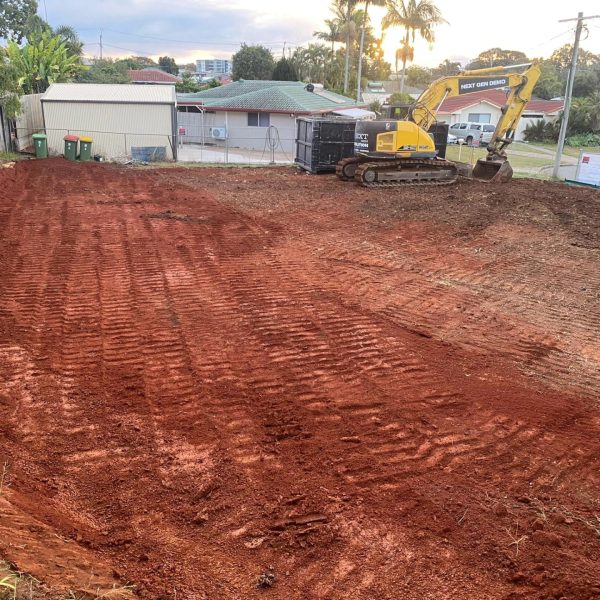Demolition projects require careful planning and coordination to pull off successfully. Unfortunately, the rainy season can pose major challenges when you’re planning demolition in the Gold Coast area. Before you start, here are a few things to consider according to experts, including weather-related risks, how to plan and minimise delays, and meet compliance requirements.
Weather-Related Risks During Demolition
Slippery Ground, Poor Visibility and Other Hazards
Rainy conditions make demolition sites more hazardous. Wet surfaces create slip risks for workers, while reduced visibility during storms increases the chances of accidents. Electrical hazards also become more pronounced when water comes into contact with exposed wiring or machinery.
Soil Instability
Heavy rainfall can quickly destabilise soil, leading to erosion or sinkage around the demolition site. On sloped or excavated blocks, this instability increases the risk of landslips or collapsing ground, which can compromise both safety and the structural integrity of surrounding properties.

Equipment and Machinery Issues
Demolition relies on heavy machinery like excavators and trucks, which aren’t designed to operate efficiently on waterlogged ground. Rain can damage sensitive equipment, cause engines to stall, or limit access to certain areas of the site. This slows progress and adds to project costs.
Timeline Disruptions
Even moderate rainfall can cause demolition work to pause. Flooded sites, inaccessible roads, and safety concerns often lead to unexpected downtime. These delays push back not only the demolition but also the start of the construction phase, affecting the overall project schedule.
Plan to Minimise Delays
Flexible Scheduling
Demolition projects on the Gold Coast should always allow extra time for weather-related setbacks. Building in contingency days or weeks ensures that rainfall doesn’t derail the overall project timeline, giving you breathing room if works need to pause.
Early Site Preparation
Preparing the site before the heaviest rains hit makes a big difference. Clearing vegetation, grading surfaces, and securing loose materials helps minimise hazards. By stabilising the ground early, you reduce the risk of flooding and erosion disrupting the work.
Coordination with Builders
Close communication between demolition contractors and builders is key. Coordinating schedules allows construction teams to mobilise as soon as demolition is complete, reducing wasted downtime. This teamwork also ensures the site remains prepared if unexpected delays occur.
Backup Plans
Weather on the Gold Coast can be unpredictable, so it’s smart to have backup plans. Staging works in smaller sections or having alternate demolition dates ready keeps the project moving forward, even if heavy rains temporarily halt operations.
Drainage and Site Management
Temporary Drainage Systems
Putting temporary drainage in place during demolition helps prevent water from pooling on-site. Channels, trenches, or pumps can direct excess water away from work areas, keeping the ground more stable and reducing delays.
Preventing Soil Washout
Heavy rain can wash soil and debris into unwanted areas, creating hazards and compliance issues. Proper site management, such as covering exposed soil or installing barriers, keeps materials contained and prevents damage to surrounding land.
Controlling Debris Movement
Rainwater can move loose debris around a site, making cleanup harder and increasing risks to neighbouring properties. Using secure containment methods and fencing ensures materials stay in place, even during a storm.
Stormwater Management Measures
Tools like silt fencing and sediment traps are often required on Gold Coast sites. These measures stop contaminated runoff from entering drains and waterways, protecting the environment while keeping your project compliant.
Legal and Compliance Requirements
Workplace Health and Safety (WHS) Obligations
In Queensland, demolition contractors must follow strict WHS laws to keep workers safe, particularly in hazardous weather. This includes risk assessments for wet conditions, ensuring machinery is used safely, and pausing works when rainfall makes the site unsafe.
Erosion and Sediment Control
Gold Coast City Council requires erosion and sediment control measures on all demolition and construction sites. Contractors must install barriers, drains, or silt fences to stop runoff carrying soil, debris, or contaminants into public stormwater systems.
Council Approval and Compliance
Depending on the site, you may need council approval for demolition, especially if stormwater or drainage systems are affected. Compliance inspections can occur during or after works, so having proper controls in place is essential to avoid fines or delays.
Work With Expert Teams for Demolition in Gold Coast During Rainy Weather
Before you can start demolition in Gold Coast during rainy weather, it’s important to consider weather-related risks, compliance requirements, and how you’ll plan the project. Common risks in the rainy season include soil instability, machinery issues, and hazards like poor visibility. You should also include the weather in your timelines, prepare the site early on, coordinate with builders, and have alternate dates for demolition in case the weather becomes unstable.
Most importantly, you should work with local experts who have experience working with the Gold Coast weather. Next Gen Demolition is an experienced team that has handled projects of different sizes while tackling harsh weather conditions.
